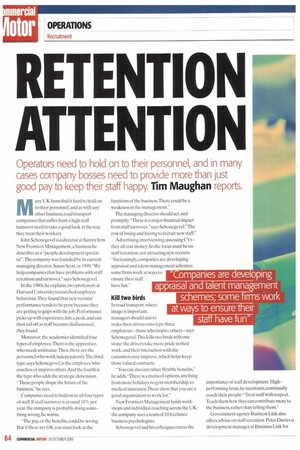RETENTION ATTENTION
Page 64

Page 65

If you've noticed an error in this article please click here to report it so we can fix it.
Operators need to hold on to their personnel, and in many cases company bosses need to provide more than just
good pay to keep their staff happy. run Maughan reports.
Many UK firms find it hard to hold on to their personnel, and as with any other business, road transport companies that suffer from a high staff turnover need to take a good look at the way they treat their workers.
John Schonegevel is a director at Surrey firm New Frontiers Management, a business he describes as a "people development specialist".The company was founded by its current managing director. Susan Scott, in 1999."We help companies that have problems with staff retention and turnover," says Schonegevel.
In the 1980s, he explains, two professors at Harvard University researched employee behaviour.They found that new recruits' performance tends to be poor because they are getting to grips with the job. Performance picks up with experience, hits a peak, and can then tail off as staff become disillusioned, they found.
Moreover, the academics identified four types of employee.There is the apprentice, who needs assistance.Then, there are the personnel who work independently. The third type, says Schonegevel, is the employee who coaches, or inspires others. And the fourth is the type who adds the strategic dimension. "These people shape the future of the business," he says.
Companies need to hold on to all four types of staff. If staff turnover is around 10% per year, the company is probably doing something wrong, he warns.
"The pay. or the bencfits,could be wrong. But if these are OK you must look at the functions of the business.There could be a weakness in the management."
The managing director should act, and promptly "There is a major financial impact from staff turnover," says Schonegevel."The cost of losing and having to recruit new staff."
Advertising, interviewing, assessing CVs they all cost money. So the focus must be on staff retention, not attracting new recruits. "Increasingly, companies are developing appraisal and talent management schemes; some firms work at ways to ensure their staff have fun."
Kill two birds
In road transport, where image is important, managers should aim to make their drivers into type three employees-those who inspire others-says Schonegevel.This kills two birds with one stone: the drivers take more pride in their work, and their interaction with the customers may improve, which helps keep those valued contracts.
"You can also introduce flexible benefits,he adds. "There is a menu of options, anything from more holidays, to gym membership, to medical insurance.These show that you are a good organisation to work for," New Frontiers Management holds workshops and individual coaching across the UK; the company uses a team of 10 freelance business psychologists.
Schonegevel and his colleagues stress the importance of staff development. Highperforming firms, he maintains, continually coach their people: "Treat staff with respect. Teach them how they can contribute more to the business, rather than telling them."
Government agency Business Link also offers advice on staff retention. Peter Davies is development manager at Business Link for London. He speaks for the London area, but his points apply to all industrial sectors.
Employers are finding it difficult to recruit staff in the areas of IT management and sales. Personnel shortfalls in these areas can affect large road transport operators in addition to the more obvious problems experienced with filling driving jobs. Prevention is better than cure, so operators need to look at methods of staff retention, not just recruitment.
"I think that in Business Link for London's experience people leave businesses because of competition [from other firms], and a lack of career opportunities, skills development and training," Davies reports. To stand out from the crowd, he says,firms need to adopt a holistic approach:"Each company must provide a unique package, and a financial package is top of the agenda."
But there's more to life than money, and not every firm can pay top-whack wages.To compensate for this financial shortfall, operators can invest in their teams...There should be fair and transparent systems of training, and managers should get this across to their staff," says Davies.
Managing directors themselves may lack essential skills, which can affect the workforce.
To remedy this, Business Link runs the Addmore Management and Leadership Initiative. Firms with between 20 and 249 employees can apply for it; the training includes interpersonal skills for managers. "It's a very flexible programme" Davies remarks. Managers can identify areas where they themselves require training."We contribute £1,000 of support per [senior management] person, plus a free assessment and action plan."
Trickle-down approach
This programme is aimed at senior management.The newly found knowledge will trickle down through the company hopefully. "I think one of the key problems of the managing director is an inability to delegate," he says. They take more and more responsibility on their shoulders, but the ultimate experience of this is stress.They run around in ever-decreasing circles," Business Link aims to recruit all managers to the Addmore course by March 2006; companies will have until March 2007 to spend the training money.
Davies advises the managing director to take a step back, identify problems and take action:"If people are overworked they are likely to miss the opportunities and neglect the core business, which puts more stress on the employees."
A separate Addmore scheme has been designed to assist the workforce. Again, Business Link can provide up to fl .000 per firm.
As well as training, benefits such as childcare schemes and flexible working can also be effective ways of retaining staff, Davies points out. Bosses need to think about these added extras. "Money alone may not solve the retention problem," he concludes. •










































































































































































































